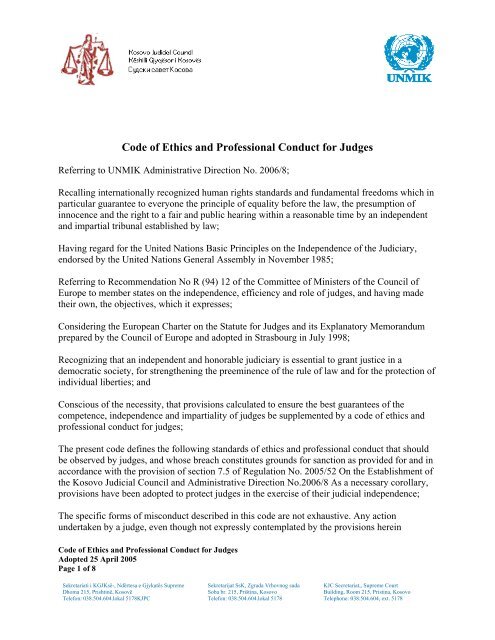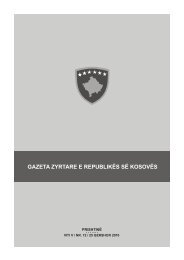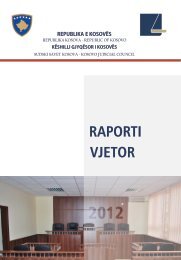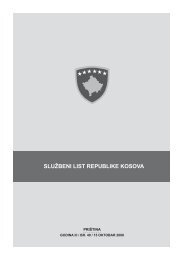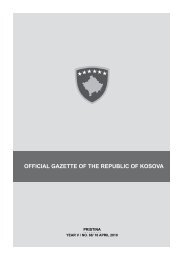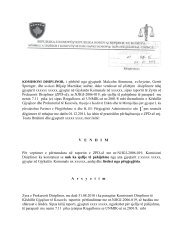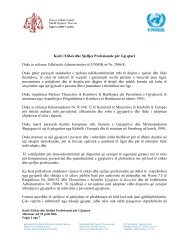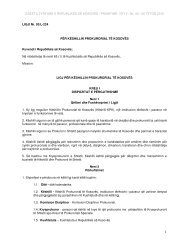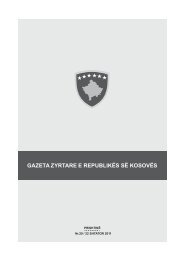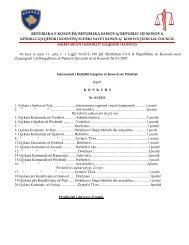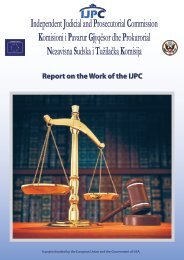Code of ethics and professional conduct for judges
Code of ethics and professional conduct for judges
Code of ethics and professional conduct for judges
Create successful ePaper yourself
Turn your PDF publications into a flip-book with our unique Google optimized e-Paper software.
<strong>Code</strong> <strong>of</strong> Ethics <strong>and</strong> Pr<strong>of</strong>essional Conduct <strong>for</strong> JudgesReferring to UNMIK Administrative Direction No. 2006/8;Recalling internationally recognized human rights st<strong>and</strong>ards <strong>and</strong> fundamental freedoms which inparticular guarantee to everyone the principle <strong>of</strong> equality be<strong>for</strong>e the law, the presumption <strong>of</strong>innocence <strong>and</strong> the right to a fair <strong>and</strong> public hearing within a reasonable time by an independent<strong>and</strong> impartial tribunal established by law;Having regard <strong>for</strong> the United Nations Basic Principles on the Independence <strong>of</strong> the Judiciary,endorsed by the United Nations General Assembly in November 1985;Referring to Recommendation No R (94) 12 <strong>of</strong> the Committee <strong>of</strong> Ministers <strong>of</strong> the Council <strong>of</strong>Europe to member states on the independence, efficiency <strong>and</strong> role <strong>of</strong> <strong>judges</strong>, <strong>and</strong> having madetheir own, the objectives, which it expresses;Considering the European Charter on the Statute <strong>for</strong> Judges <strong>and</strong> its Explanatory Memor<strong>and</strong>umprepared by the Council <strong>of</strong> Europe <strong>and</strong> adopted in Strasbourg in July 1998;Recognizing that an independent <strong>and</strong> honorable judiciary is essential to grant justice in ademocratic society, <strong>for</strong> strengthening the preeminence <strong>of</strong> the rule <strong>of</strong> law <strong>and</strong> <strong>for</strong> the protection <strong>of</strong>individual liberties; <strong>and</strong>Conscious <strong>of</strong> the necessity, that provisions calculated to ensure the best guarantees <strong>of</strong> thecompetence, independence <strong>and</strong> impartiality <strong>of</strong> <strong>judges</strong> be supplemented by a code <strong>of</strong> <strong>ethics</strong> <strong>and</strong>pr<strong>of</strong>essional <strong>conduct</strong> <strong>for</strong> <strong>judges</strong>;The present code defines the following st<strong>and</strong>ards <strong>of</strong> <strong>ethics</strong> <strong>and</strong> pr<strong>of</strong>essional <strong>conduct</strong> that shouldbe observed by <strong>judges</strong>, <strong>and</strong> whose breach constitutes grounds <strong>for</strong> sanction as provided <strong>for</strong> <strong>and</strong> inaccordance with the provision <strong>of</strong> section 7.5 <strong>of</strong> Regulation No. 2005/52 On the Establishment <strong>of</strong>the Kosovo Judicial Council <strong>and</strong> Administrative Direction No.2006/8 As a necessary corollary,provisions have been adopted to protect <strong>judges</strong> in the exercise <strong>of</strong> their judicial independence;The specific <strong>for</strong>ms <strong>of</strong> mis<strong>conduct</strong> described in this code are not exhaustive. Any actionundertaken by a judge, even though not expressly contemplated by the provisions herein<strong>Code</strong> <strong>of</strong> Ethics <strong>and</strong> Pr<strong>of</strong>essional Conduct <strong>for</strong> JudgesAdopted 25 April 2005Page 1 <strong>of</strong> 8Sekretariati i KGJKsë-, Ndërtesa e Gjykatës SupremeDhoma 215, Prishtinë, KosovëTelefon: 038.504.604.lokal 5178KJPCSekretarijat SsK, Zgrada Vrhovnog sudaSoba br. 215, Priština, KosovoTelefon: 038.504.604.lokal 5178KJC Secretariat,, Supreme CourtBuilding, Room 215, Pristina, KosovoTelephone: 038.504.604, ext. 5178
contained but having a similar effect, may be considered a breach <strong>of</strong> this code <strong>and</strong> consequentlysanctioned;This code is to be construed in such a way as to be consistent with the laws <strong>and</strong> regulations <strong>of</strong>Kosovo <strong>and</strong> international legal bodies <strong>and</strong> so as to not infringe on the essential independence <strong>of</strong><strong>judges</strong> in making judicial decisions;This code applies to all pr<strong>of</strong>essional <strong>judges</strong> in Kosovo, at all levels <strong>of</strong> proceedings includingMinor Offences Courts.I. GENERAL PRINCIPLES1. A judge shall act at all times in a manner that promotes public confidence in the dignity,integrity <strong>and</strong> independence <strong>of</strong> the judiciary.2. A judge shall:a) Observe high st<strong>and</strong>ards <strong>of</strong> pr<strong>of</strong>essional <strong>and</strong> personal <strong>conduct</strong>,b) Respect <strong>and</strong> comply with the law,c) Per<strong>for</strong>m the duties <strong>of</strong> <strong>of</strong>fice impartially <strong>and</strong> diligently,d) Avoid any <strong>conduct</strong> <strong>and</strong> situation that could lead to a judge’s integrity, impartiality orindependence, being questioned,e) Per<strong>for</strong>m his/her duties in con<strong>for</strong>mity with internationally recognized human rightsst<strong>and</strong>ards.3. This applies not only to the judge’s pr<strong>of</strong>essional life but also to a judge’s private life, when ajudge’s actions may impair the judge’s image in the public’s eye, thus affecting the judiciary as awhole.II.SPECIFIC RULES OF ETHICSA. Judicial Activities1. In proceedings, a judge has a duty to protect the rights <strong>and</strong> freedoms <strong>of</strong> all persons.<strong>Code</strong> <strong>of</strong> Ethics <strong>and</strong> Pr<strong>of</strong>essional Conduct <strong>for</strong> JudgesAdopted 25 April 2005Page 2 <strong>of</strong> 8Sekretariati i KGJKsë-, Ndërtesa e Gjykatës SupremeDhoma 215, Prishtinë, KosovëTelefon: 038.504.604.lokal 5178KJPCSekretarijat SsK, Zgrada Vrhovnog sudaSoba br. 215, Priština, KosovoTelefon: 038.504.604.lokal 5178KJC Secretariat,, Supreme CourtBuilding, Room 215, Pristina, KosovoTelephone: 038.504.604, ext. 5178
2. In exercising judicial responsibilities, a judge has the duty to ensure that the law,including the internationally recognized st<strong>and</strong>ards, is properly applied <strong>and</strong> that cases are dealtwith fairly by avoiding any discriminatory attitude against any person or persons based on anyground, including sex, gender, age, marital status, language, mental or physical disability, sexualorientation, political affiliation or conviction, ethnic origin, nationality, religion or belief, race,social origin, property, birth or any other status. A judge should be acquainted with variedcultural values to better underst<strong>and</strong> the social <strong>and</strong> personal problems <strong>of</strong> the people with whomhe/she interacts when per<strong>for</strong>ming the judicial <strong>of</strong>fice.3. A judge has in particular the following responsibilities:a) to act impartially <strong>and</strong> independently in all cases <strong>and</strong> free from any outside influence, <strong>and</strong>per<strong>for</strong>m judicial duties based on the facts <strong>and</strong> the law applicable in each case, withoutany restriction, improper influence, inducements, pressures, threats <strong>of</strong> interferences,direct or indirect, from any quarter;b) to avoid any potential conflict <strong>of</strong> interest based on family or social relationships as wellas financial or pr<strong>of</strong>essional relationships;c) if, <strong>for</strong> any reason, a judge feels unable to comply with the provisions <strong>of</strong> the previousparagraphs <strong>of</strong> this section, he/she must take immediate action, including recluse from acase <strong>and</strong> invoking the President <strong>of</strong> the Court where he/she serves to exempt him/her fromthe case. If a judge is in a situation which could cause his/her independence to be calledinto question, he/she is under the obligation to disclose the facts <strong>of</strong> the situation to theparties involved <strong>and</strong> in<strong>for</strong>m them as to his/her possible disqualification;d) in any event, if a judge becomes aware <strong>of</strong> any other conflict <strong>of</strong> interest or there are anyother circumstances that might raise doubts as to his/her impartiality, he/she mustdiscontinue all activity on the case <strong>and</strong> report such circumstances to the President <strong>of</strong> theCourt, unless otherwise provided by law.B. Non judicial activities1. Generally a judge may freely carry out activities outside the scope <strong>of</strong> the judicial m<strong>and</strong>ateincluding those activities which are the embodiments <strong>of</strong> his/her rights as a citizen or whichrepresent his/her pr<strong>of</strong>essional interests <strong>and</strong> independence. This freedom is only limited in so faras such outside activities are incompatible with confidence in a judge, or the impartiality orindependence <strong>of</strong> a judge, or his/her required availability to deal attentively <strong>and</strong> within a<strong>Code</strong> <strong>of</strong> Ethics <strong>and</strong> Pr<strong>of</strong>essional Conduct <strong>for</strong> JudgesAdopted 25 April 2005Page 3 <strong>of</strong> 8Sekretariati i KGJKsë-, Ndërtesa e Gjykatës SupremeDhoma 215, Prishtinë, KosovëTelefon: 038.504.604.lokal 5178KJPCSekretarijat SsK, Zgrada Vrhovnog sudaSoba br. 215, Priština, KosovoTelefon: 038.504.604.lokal 5178KJC Secretariat,, Supreme CourtBuilding, Room 215, Pristina, KosovoTelephone: 038.504.604, ext. 5178
easonable period with the matters put be<strong>for</strong>e him/her. Subject to this section, a judge mayengage in the following activities:(a) speak, write, lecture, teach <strong>and</strong> participate in other activities concerning the law, the legalsystem, <strong>and</strong> the administration <strong>of</strong> justice, including engagement in these activitiesthrough organizations or governmental agencies devoted to it; <strong>and</strong>(b) engage in the arts, sports <strong>and</strong> other social <strong>and</strong> recreational activities as well as participatein civic <strong>and</strong> charitable activities.2. In particular, a judge shall not:a) be engaged in any activity, including political activity, which is incompatible with ajudge’s functions;b) hold an <strong>of</strong>fice in or be a member <strong>of</strong> any political party; orc) engage in any non-judicial activity during working hours without prior approval <strong>of</strong> theKosovo Judicial Council <strong>and</strong> shall not accept any compensation <strong>for</strong> any outside activityengaged during business hours, without the Kosovo Judicial Council approval.3. In determining whether a judge is permitted to accept compensation <strong>for</strong> engaging in nonjudicialactivity during working hours, the Kosovo Judicial Council will apply the followingconditions equally <strong>for</strong> all <strong>judges</strong>:a) The amount <strong>of</strong> compensation shall not exceed a reasonable amount, or shall not exceedwhat a person who is not a judge would receive <strong>for</strong> the same activity;b) The amount <strong>of</strong> compensation shall not exceed 25 percent <strong>of</strong> a judge’s usual salary; <strong>and</strong>c) The source <strong>of</strong> the compensation payment shall not lead to the appearance <strong>of</strong> impropriety.4. A judge shall not promote or participate in any organization supporting any kind <strong>of</strong>discrimination.5. Judges are <strong>for</strong>bidden from using their position or in<strong>for</strong>mation they obtain through theirposition <strong>for</strong> either their own personal gain or <strong>for</strong> the personal gain <strong>of</strong> anyone else.6. A judge shall not personally solicit funds <strong>for</strong> an organization or agency, allow his/hername to be used in solicitation <strong>of</strong> funds or allow the use <strong>of</strong> the prestige <strong>of</strong> judicial <strong>of</strong>fice <strong>for</strong> thatpurpose.7. A judge shall refrain from financial <strong>and</strong> business dealings that tend to reflect adversely onhis/her impartiality, interfere with the proper per<strong>for</strong>mance <strong>of</strong> judicial duties, exploit his/her<strong>Code</strong> <strong>of</strong> Ethics <strong>and</strong> Pr<strong>of</strong>essional Conduct <strong>for</strong> JudgesAdopted 25 April 2005Page 4 <strong>of</strong> 8Sekretariati i KGJKsë-, Ndërtesa e Gjykatës SupremeDhoma 215, Prishtinë, KosovëTelefon: 038.504.604.lokal 5178KJPCSekretarijat SsK, Zgrada Vrhovnog sudaSoba br. 215, Priština, KosovoTelefon: 038.504.604.lokal 5178KJC Secretariat,, Supreme CourtBuilding, Room 215, Pristina, KosovoTelephone: 038.504.604, ext. 5178
judicial position, or involve him/her in transactions with lawyers or persons likely to comebe<strong>for</strong>e the court on which he/she serves.8. For the entire term <strong>of</strong> their appointment, <strong>judges</strong> are <strong>for</strong>bidden to <strong>conduct</strong> other legalpractice or privately carry out any judicial functions (such us to act as defenders, arbiters, ormediators). They may be appointed as a guardians or personal representatives only in casesprovided by law.9. A judge <strong>and</strong> his/her family shall not, under any circumstance, accept gifts, favors,privileges, or promises <strong>for</strong> material help from any person having a direct or indirect interest in acase being tried by the judge.10. Every year a judge must provide disclosure to the Kosovo Judicial Council <strong>of</strong> his/herfinancial interests, <strong>and</strong> those <strong>of</strong> their immediate family members, in accordance with the law.For the purposes <strong>of</strong> this provision, a financial interest includes personal property such as bankaccounts, stocks, bonds, houses <strong>and</strong> motor vehicles. A judge shall provide bank statements uponthe request <strong>of</strong> the Kosovo Judicial Council. Disclosure <strong>of</strong> bank account statements shall be madewithin fourteen (14) days <strong>of</strong> such request.III.SPECIFIC RULES OF PROFESSIONAL CONDUCTA. Adjudicative responsibilities1. A judge has the duty, in exercising his/her judicial responsibilities, to ensure that casesare dealt with fairly <strong>and</strong> efficiently. This implies, in particular, a duty to ensure that a fair hearingis given to all parties <strong>and</strong> that the procedural rights <strong>of</strong> the parties are respected throughout theproceeding, <strong>and</strong> to avoid any undue delays as well as any <strong>for</strong>ms <strong>of</strong> absenteeism <strong>and</strong> negligence atwork.2. When hearing a case, a judge has a particular obligation to seek the truth. This impliescalling <strong>for</strong> additional witnesses <strong>and</strong> ordering further <strong>for</strong>ensic tests whenever he/she considers itnecessary <strong>for</strong> the sake <strong>of</strong> determining the truth;3. A judge shall maintain <strong>and</strong> improve the highest st<strong>and</strong>ards <strong>of</strong> pr<strong>of</strong>essionalism <strong>and</strong> legalexpertise <strong>and</strong> <strong>for</strong> that purpose shall engage in continuing legal education <strong>and</strong> training as<strong>Code</strong> <strong>of</strong> Ethics <strong>and</strong> Pr<strong>of</strong>essional Conduct <strong>for</strong> JudgesAdopted 25 April 2005Page 5 <strong>of</strong> 8Sekretariati i KGJKsë-, Ndërtesa e Gjykatës SupremeDhoma 215, Prishtinë, KosovëTelefon: 038.504.604.lokal 5178KJPCSekretarijat SsK, Zgrada Vrhovnog sudaSoba br. 215, Priština, KosovoTelefon: 038.504.604.lokal 5178KJC Secretariat,, Supreme CourtBuilding, Room 215, Pristina, KosovoTelephone: 038.504.604, ext. 5178
determined by the Kosovo Judicial Council, <strong>and</strong> when not incompatible with other judicialduties.4. As a precondition to being involved in adjudicating actions involving juveniles a <strong>judges</strong>hall have the relevant pr<strong>of</strong>essional qualifications <strong>and</strong>/or experience, as required by the JuvenileJustice <strong>Code</strong> <strong>of</strong> Kosovo.5. When permitted by law <strong>and</strong> if appropriate, a judge shall encourage the parties to reach afriendly settlement. In any event <strong>and</strong> except where the law or established practice otherwiseprovides, a judge shall give clear <strong>and</strong> complete reasons <strong>for</strong> his/her judgments <strong>and</strong>, wherenecessary, explain procedural matters to parties in an impartial manner using language which isreadily underst<strong>and</strong>able.6. When applicable, a judge shall respect the secrecy <strong>of</strong> in<strong>for</strong>mation entrusted to him/her<strong>and</strong>/or confidentiality <strong>of</strong> the proceedings. This implies that while a proceeding is pending in anycourt, the judge shall not make any public comment that might reasonably be expected to affectits outcome, impair its fairness, or undermine the judiciary's credibility, <strong>and</strong> shall require similarabstention on the part <strong>of</strong> court personnel subject to the judge’s direction <strong>and</strong> control.7. Except in cases provided by law, a judge shall not engage in <strong>and</strong> discourage ex-partecommunication. Upon occurrence <strong>of</strong> such communication the judge must disclose promptly therelevant in<strong>for</strong>mation to the other parties involved <strong>and</strong>, when possible, procure their attendance.8. In the per<strong>for</strong>mance <strong>of</strong> judicial duties a judge shall not use words or <strong>conduct</strong> manifestingbias or prejudice <strong>and</strong> shall not allow staff, court <strong>of</strong>ficials <strong>and</strong> others subject to the judge’sdirection <strong>and</strong> control to do so.9. A judge shall show availability <strong>and</strong> respect <strong>for</strong> individuals , be patient, dignified <strong>and</strong>courteous to litigants, defendants, witnesses, lawyers, prosecutors other <strong>judges</strong> <strong>and</strong> lay-<strong>judges</strong><strong>and</strong> any third party with whom he/she deals in his/her <strong>of</strong>ficial capacity, <strong>and</strong> should requirereciprocity from lawyers, staff <strong>and</strong> court <strong>of</strong>ficials, <strong>and</strong> others with whom he/she may come incontact during the court proceedings or who are subject to his/her direction <strong>and</strong> control.10. When dealing with the media <strong>and</strong> the public:a) Judges may not express preliminary legal opinions on pending cases.b) Judges may in<strong>for</strong>m the media about the case management in court.<strong>Code</strong> <strong>of</strong> Ethics <strong>and</strong> Pr<strong>of</strong>essional Conduct <strong>for</strong> JudgesAdopted 25 April 2005Page 6 <strong>of</strong> 8Sekretariati i KGJKsë-, Ndërtesa e Gjykatës SupremeDhoma 215, Prishtinë, KosovëTelefon: 038.504.604.lokal 5178KJPCSekretarijat SsK, Zgrada Vrhovnog sudaSoba br. 215, Priština, KosovoTelefon: 038.504.604.lokal 5178KJC Secretariat,, Supreme CourtBuilding, Room 215, Pristina, KosovoTelephone: 038.504.604, ext. 5178
c) In any public statements <strong>judges</strong> shall be pr<strong>of</strong>essional <strong>and</strong> strive to maintain theappearance <strong>of</strong> independence <strong>and</strong> impartiality.B. Administrative responsibilities1. A judge shall discharge his/her administrative responsibilities with pr<strong>of</strong>essionalism <strong>and</strong>diligence <strong>and</strong> shall cooperate with other <strong>judges</strong> <strong>and</strong> court <strong>of</strong>ficials in the administration <strong>of</strong> theCourt’s activities.2. In particular, a judge shall:a) respect the necessary obligations pertaining to his/her function in terms <strong>of</strong> supervision <strong>of</strong>the other court staff under his/her control.b) organize his/her activities <strong>and</strong> respect the particular obligations <strong>of</strong> time <strong>and</strong> dutynecessary to per<strong>for</strong>m such activities.c) comply with administrative instructions from the Department <strong>of</strong> Justice to the extent suchinstructions are aimed at ensuring compliance with the applicable law governing thecourts’ administrative operations, <strong>and</strong> provided that there is no resulting interference withtheir free judgment in their adjudicating function.3. The function <strong>of</strong> Court President requires a particularly high degree <strong>of</strong> responsibility. ACourt President must display a particular commitment to his/her responsibilities as CourtPresident, in terms <strong>of</strong> court administration <strong>and</strong> court management, in addition to adjudicativeactivities. This includes appropriate practice <strong>of</strong> organizational, managerial <strong>and</strong> human resourcesskills in a judicial context.A Court President shall ensure that his/her court is freely accessible to all members <strong>of</strong> the public,including by ensuring that notices are posted in the <strong>of</strong>ficial languages <strong>of</strong> the particular region <strong>and</strong>the court is free from the display <strong>of</strong> nationalistic symbols, <strong>and</strong> by ensuring access to the disabled.4. Because the Court President is representing the Court, he/she is under a particularobligation to preserve the image <strong>of</strong> the judiciary, <strong>and</strong> demonstrate the seriousness <strong>and</strong> dignitythat citizens are entitled to expect from the justice system.<strong>Code</strong> <strong>of</strong> Ethics <strong>and</strong> Pr<strong>of</strong>essional Conduct <strong>for</strong> JudgesAdopted 25 April 2005Page 7 <strong>of</strong> 8Sekretariati i KGJKsë-, Ndërtesa e Gjykatës SupremeDhoma 215, Prishtinë, KosovëTelefon: 038.504.604.lokal 5178KJPCSekretarijat SsK, Zgrada Vrhovnog sudaSoba br. 215, Priština, KosovoTelefon: 038.504.604.lokal 5178KJC Secretariat,, Supreme CourtBuilding, Room 215, Pristina, KosovoTelephone: 038.504.604, ext. 5178
5. A Court President <strong>and</strong> any judge in charge <strong>of</strong> case allocation should not be influenced bythe wishes <strong>of</strong> any party to the case or any person concerned with the results <strong>of</strong> the case.There<strong>for</strong>e, allocation based on drawing <strong>of</strong> lots, automatic distribution according to alphabeticorder, or some similar system, should be used to assign cases.Adopted by 25 April 2006Amendment adopted by 5 September 2006Rexhep Haxhimusa_____________________PresidentKosovo Judicial Council<strong>Code</strong> <strong>of</strong> Ethics <strong>and</strong> Pr<strong>of</strong>essional Conduct <strong>for</strong> JudgesAdopted 25 April 2005Page 8 <strong>of</strong> 8Sekretariati i KGJKsë-, Ndërtesa e Gjykatës SupremeDhoma 215, Prishtinë, KosovëTelefon: 038.504.604.lokal 5178KJPCSekretarijat SsK, Zgrada Vrhovnog sudaSoba br. 215, Priština, KosovoTelefon: 038.504.604.lokal 5178KJC Secretariat,, Supreme CourtBuilding, Room 215, Pristina, KosovoTelephone: 038.504.604, ext. 5178


